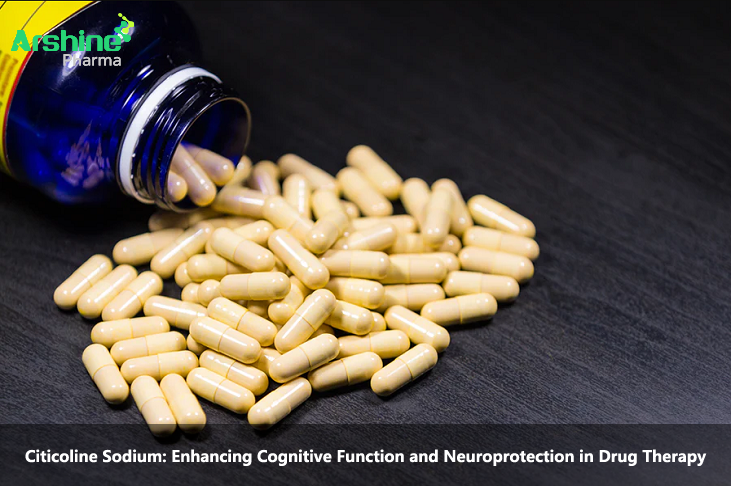
Introduction:Citicoline sodium, also known as cytidine diphosphate-choline, is a naturally occurring compound that has gained recognition for its potential benefits in drug therapy, particularly in the realm of cognitive function and neuroprotection. This article aims to explore the role of citicoline sodium in drugs, including its properties, mechanisms of action, therapeutic indications, dosage, potential side effects, and current research. By understanding its significant contributions to brain health and its impact on various medical conditions, we can appreciate the value of citicoline sodium in drug therapy.
Properties and Mechanisms of Action: Citicoline sodium is a cholinergic compound that serves as an intermediate in the biosynthesis of phospholipids, particularly phosphatidylcholine, which is essential for maintaining the structural integrity and function of cell membranes in the brain. It also acts as a precursor for the synthesis of neurotransmitters such as acetylcholine. Citicoline sodium exhibits neuroprotective effects by enhancing brain metabolism, promoting the synthesis of phospholipids, and facilitating the repair of damaged neuronal membranes.
Therapeutic Indications: Citicoline sodium has been investigated for its potential therapeutic applications in various medical conditions that involve cognitive impairment, neurodegeneration, and brain injury. It has shown promise in the management of conditions such as stroke, traumatic brain injury, Alzheimer's disease, Parkinson's disease, and age-related cognitive decline. Additionally, citicoline sodium is used as an adjuvant therapy in the treatment of glaucoma and optic nerve disorders.
Dosage and Administration: The dosage of citicoline sodium may vary depending on the specific medical condition being treated, the severity of the condition, and the individual patient's response. Typical dosages range from 500 mg to 2000 mg per day, administered orally or through intravenous infusion, depending on the formulation and the physician's recommendation. It is important to consult with a healthcare professional to determine the appropriate dosage and administration method for each patient.
Cognitive Enhancement and Neuroprotection: Citicoline sodium has been extensively studied for its potential cognitive-enhancing effects. Research suggests that it may improve attention, memory, and executive functions in individuals with cognitive impairment associated with various conditions, including Alzheimer's disease and vascular dementia. Citicoline sodium's neuroprotective properties, including its ability to enhance neuronal membrane repair, promote neuronal survival, and modulate neurotransmitter systems, make it an attractive option for protecting against brain damage caused by ischemic stroke, traumatic brain injury, and neurodegenerative disorders.
Potential Side Effects and Safety Considerations: Citicoline sodium is generally well-tolerated, with few reported side effects. Commonly reported adverse events include gastrointestinal disturbances, headache, insomnia, and dizziness, which are usually mild and transient. Serious adverse effects are rare but may include allergic reactions or hypersensitivity. As with any medication, it is important to consider individual patient factors, including underlying medical conditions and medication interactions, and to consult with a healthcare professional before initiating citicoline sodium therapy.
Current Research and Future Directions: Research on the therapeutic potential of citicoline sodium in drug therapy is ongoing, with a focus on elucidating its mechanisms of action and exploring its efficacy in different medical conditions. Clinical trials are being conducted to further evaluate its cognitive-enhancing effects, neuroprotective properties, and its impact on various neurological disorders. Future directions also include exploring combination therapies and identifying patient subpopulations that may benefit most from citicoline sodium treatment.
Conclusion: Citicoline sodium holds promise as a valuable compound in drug therapy, particularly in the domains of cognitive enhancement and neuroprotection. Through its role in promoting neuronal membrane repair, enhancing brain metabolism, and influencing neurotransmitter systems, citicoline sodium may offer significant benefits in conditions such as stroke, traumatic brain injury, Alzheimer's disease, and age-related cognitive decline. As ongoing research continues to unravel its therapeutic potential, citicoline sodium has the potential to revolutionize treatment approaches and improve outcomes for patients facing cognitive impairment and neurodegenerative disorders.
